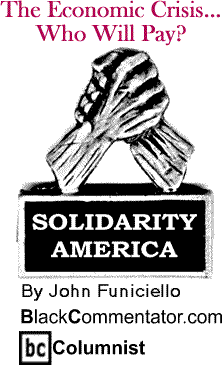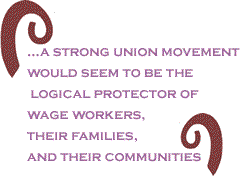
|
|||||||||||||||||||||||

|
|

Custom Search
|
|
 |
|
The financial crises in economies around the world have caused political leaders to join together to find solutions that do not appear to put the burden on the one perennial source of wealth that seems to be a constant: earnings of working people. After all, how many times can a country go to that well? It
may have started with the meltdown of American financial and banking
institutions, but since every other developed economy in the world
is somehow tied to the
Some comments were left floating in the air about addressing the rapacious kind of capitalism that America has experienced for three decades or more (not that it was a cakewalk for working people in the century before that), but there is no placing of blame on the corporate leaders of the firms who have come to the people with their hands out. That’s why it was refreshing recently to hear from German Chancellor Angela Merkel that one of that country’s biggest mortgage-real estate firms would be bailed out, but that those who were responsible for the problems will be held to account. This
is one of the differences between the kind of mature mix of capitalism
and socialism that exists in European countries and elsewhere in
the developed world and the wild frontier economy of the While
the poor still exist and there is talk of a growing underclass in
many of the countries, there is at least discussion of social problems.
In the In
some countries, the sheriff is on duty. In the
But, whether they are union or non-union jobs, these are some of the better-paying jobs in the economy that are being lost. It’s not likely that the job loss the professionals talk about are the $7.50 an hour jobs. They are the ones that are paying upwards of $25 an hour, with benefits and a pension (the people who can provide the wherewithal for a bailout). They’re good jobs that could be lost for good. In this economic crisis, compounded by the deadly spike in petroleum prices, a whole new chapter is going to be written in the worldwide auto industry and it does not bode well for the American auto industry. As soon as other countries, like India and Brazil, find a way to produce their high-fuel-economy cars and trucks to meet American standards, there may be little left of the U.S. car companies, whether they are owned by foreign or domestic corporations. The labor costs are cheaper there and that’s the key ingredient in production that transnational corporations have sought. Places where unions are either weak or non-existent are the target countries for production. It has been clear for decades that global corporations have no loyalty to the nation in which they might have been created or where their worldwide headquarters are located. That fits the description of most American transnational corporations. It
has been conventional wisdom that the second most important purchase
that an American makes - after the purchase of a house - is the
purchase of an automobile. The duration of an auto loan has increased
since the 1970s from three years to five years. The
American worker can not fight back against the gutting of the American
economy by the transnational corporations without some kind of organization
to protect their interests. Some would say that this is the purview
of a socially-conscious political party. That kind of party has
not existed in the In
light of that and, within the context of the political system we
have, a strong union movement would seem to be the logical protector
of wage workers, their families, and their communities. But a relentless
assault on even the concept of a vigorous union movement by both
government and Corporate America since the Reagan era has sharply
reduced the possibility of a resurgent movement in the near future.
This is why it is heartening to hear that somewhere, someone will
be held responsible for reckless behavior in the public sphere and
that, in There
isn’t even a pretense in the American workers have been told that a portion of the $1 trillion bailout will be paid back, but that’s rather hard to figure, because there doesn’t even seem to be a hard number for a bailout total. Viewed from some of these other countries, Americans who are losing their jobs and their homes by the millions - yet, continue to work for wages and pay their taxes - would be considered members of a growing underclass. In
those same countries, the growing economic and financial problems
of their workers would require immediate action, which they’ve taken.
In This time, however, propaganda and ignoring the problems won’t work. There are too many chickens coming home to roost. Leaders need to act. We need to find the leaders. BlackCommentator.com Columnist John Funiciello is a labor organizer and former
union organizer. His union work started when he became a local president
of The Newspaper Guild in the early 1970s. He was a reporter for
14 years for newspapers in |
|
Any BlackCommentator.com article may be re-printed so long as it is re-printed in its entirety and full credit given to the author and www.BlackCommentator.com. If the re-print is on the Internet we additionally request a link back to the original piece on our Website. Your comments are always welcome. eMail re-print notice
If you send us an eMail message we may publish all or part of it, unless you tell us it is not for publication. You may also request that we withhold your name. Thank you very much for your readership. |
|
| |
|
| October 9, 2008 Issue 294 |
|
| Executive Editor: Bill Fletcher, Jr. |
| Managing Editor: Nancy Littlefield |
| Publisher: Peter Gamble |
| Est. April 5, 2002 |
Printer Friendly Version
in resizeable plain
text format or pdf
format. |
| Frequently Asked Questions |
 |

|
 |
 |
 |
| |
| |





























 The
The

 American
jobs are being lost at a rapid rate and businesses are closing their
doors, one after another. The auto industry is in turmoil - and
that includes the foreign car companies that make their cars in
non-union plants, mostly across the south, where the word “union”
is not a favorite.
American
jobs are being lost at a rapid rate and businesses are closing their
doors, one after another. The auto industry is in turmoil - and
that includes the foreign car companies that make their cars in
non-union plants, mostly across the south, where the word “union”
is not a favorite.





